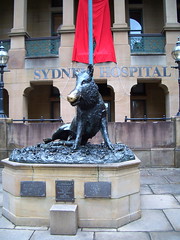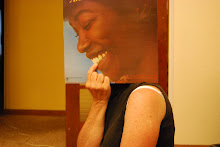 Image by frangipani photograph via Flickr
Image by frangipani photograph via Flickr
When I am with a group of friends, family or students and taking photos, I try to avoid getting my big head into t
 Image by tobym via Flickr
Image by tobym via Flickr
I was with a group of adults and kids and the kids were rubbing the lucky snout of the bronze boar outside Sydney Eye Hospital. I was setting up the photo. A young woman in jeans and unencumbered by a bag, approached me and offered to take a photo of all of us. I considered for about half a second--as I said, I'm not overly eager to get into photos; I'm also reluctant to let other people handle my camera--and then politely declined. I momentarily looked through the viewfinder to line up the shot of the child and the boar and then my eyes glanced at the spot where I had last seen the young woman. She was not there. She was not anywhere. She had vanished into the ether of Macquarie Street.
 Image via Wikipedia
Image via Wikipedia
Back to the weekend outing. I got off the train at Circular Quay and pegged a couple of exiting passengers as fellow students. Something about their demeanor, their ages and their luggage. I expected them to be on the same trajectory as me. But they weren't at the rendezvous. As I rolled up to the doorway of The Museum of Contemporary Art at 8.15, a middle-aged Asian man, similarly encumbered to me, was approaching too. I smelt him before he got very close. Cigarettes. He wasn't smoking but he smelt like a bank of ashtrays. I'm not used to the cigarette pong these days. I stopped smoking six years ago. Very few of my friends and colleagues smoke now. In the early morning air, with just two of us at the doorway, he reeked. I moved upwind of him.
My classmate (let's call him Renaldo) talked volubly and laughed genially at his own jokes for the next quarter hour while we waited at the wrong spot. At 8.35 we approached a group of likely-looking people standing 100 metres away around a bench. (Most bore the tell-tale signs of photography buffs: SLR cameras, bulky bags, comfortable shoes and well-worn visages.) I saw the two people I had picked as photography class groupies when I got off the train.
Renaldo & I were introduced to the classmates with whom we would spend the next eight hours by our teacher, Garry, who lit up, as he went over the day's programme and route. Two of my classmates lit up, too. That was my first lesson: photography is collocated with smoking. (Or maybe I just don't get out much.)
It dawned on me that Garry thought Renaldo and I were a couple, as he explained that we could share lenses. (Not bloody likely, I thought, as I had already heard too many of Renaldo's pleasantries in the quarter hour we had kept company. I spent the rest of the day putting distance between us. I reasoned that the group--and Garry--could share the wear.)
As the class progressed up through Circular Quay to the Opera House, Garry explained some things about composition, and then about using the A (Aperture) setting on our cameras. This was a revelation to me as I'd only ever used the Auto setting. The others seemed to get it. I had no idea which bits of the camera to look at or which switches to flick. (My fault: I'd overestimated my own ability.) Garry spoke patiently, and looked at my last few shots. Blue! Ah yes. I had the camera set for an incandescent light source. (I had been reading the camera manual feverishly the night before and playing with the settings. I'd forgotten to put them back to normal.)
When Garry looked closely at my camera, he suggested I buy a cleaning kit. He said my lens was a bit dirty. That it made a difference. When I looked at my photos that night, I knew he was right: most of my photos were speckled. I had thought the spicks and specks were too small to affect the photographs. In fact, a camera shop guy told me so years ago. But they did make a difference. The tiny spots on photo after photo superimpose blotches of disappointment over the whole day.
At five o'clock, the now depleted group returned via the Argyll Walk to Circular Quay station.
 I walked up the stairs to platform 1 with a classmate--let's call him Alan. I asked him about his experience with photography and photography classes, and as the train lurched through the tunnels, he told me a little about his life. In quick succession I learned that he was a teacher, that his wife had died six months ago. That she was his second wife, and the first one had died a couple of years before that.
I walked up the stairs to platform 1 with a classmate--let's call him Alan. I asked him about his experience with photography and photography classes, and as the train lurched through the tunnels, he told me a little about his life. In quick succession I learned that he was a teacher, that his wife had died six months ago. That she was his second wife, and the first one had died a couple of years before that.That evening I looked over the badly-lit, speckled productions from the day's excursion, and edited them removing the tiny blotches and dark blots. I though about the journey back home in the train. Alan with his sadness just below the surface, something that he'll have to live with and ruminate on every day. Something that can't be removed from the big picture.

![Reblog this post [with Zemanta]](http://img.zemanta.com/reblog_e.png?x-id=7837e898-9431-4597-82f7-06c133f8abfd)

It is amazing what we can learn from a photography class, that has little to do with photography and lots to do with humanity.
ReplyDeleteYes, Penny, that's it. Most of the photographs were forgettable even after I doctored them, but Alan's sadness stays in my mind.
ReplyDeleteIn Las Ramblas in Barcelona there seemed to be a competition to see who can come up with the most creative way of seperating tourists from their money and valuables. A good one is when a tourist takes a photo of a church a very dignified, well dressed but angry man will appear saying that it is forbidden to take photo's of the church, grabs the camera and rapidly make off with it.
ReplyDeleteThat's a very good one, john. I hadn't heard of that scam. It feeds on the insecurity of the stranger and the fear of the photographer. There are so many things that you're not allowed to photograph, and how do we find out? Often when someone tells us, if we haven't already read about the restrictions. I knew in Egypt, for example, that I wasn't supposed to photograph airports, police stations, government buildings, etc. But I didn't know about bakery queues. I was living there during a mutiny by conscripts. A curfew was to come into force soon and so there was a queue at the normally quiet bakery. Some colleagues and I went out to get food before the shutdown and were astounded to see a long line where we were used to seeing just a few people. I took out my camera to record this unusual situation and was approached by a very imposing man who demanded I hand over my film. People gathered around us while we argued with the man. More people gathered around us and it looked as if I didn't have a choice. Well, it did occur to me that I might run with the camera, but there were three of us. And was it so important to have a photo of a bakery queue? And so I handed over the film.
ReplyDeleteThe man who insisted on the film did not show a badge or any I.D. (But he could have been a secret policeman. There were plenty of those, even in the classes I taught.) He kept saying that it wasn't right to show Egypt in such a poor light to the outside world.
It is difficult as there are different laws all over and they keep changing all the time.
ReplyDeleteIn this country now it has become law that it is illegal to take pictures of the police though I have done and they don't appear bothered so far. I keep thinking about asking police to move out of the way so that I can take a photograph. I have to watch my cheeky mouth all the time really.
you both better watch where you take pics, lest someone accuse you of being a "terrorist".
ReplyDeleteOne never knows, as that label seems to get tossed around, like a bloody salad!
though that is insanity isn't it?
ReplyDeletewhen you think of it?
Yes, Penny, it's insane and getting crazier. Over the last few years Cityrail has employed people they call security. (Mind you, when a kid stole my weekly ticket one time and I told "security" they sent me off to see the station master.) Anyway, I was taking photos of the indicator boards & signs inside Blacktown Station to use as reading texts for my English students. And security told me to put my camera away, that it wasn't allowed. I was dumbfounded. Where are we going from here?
ReplyDelete